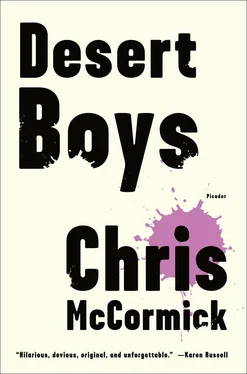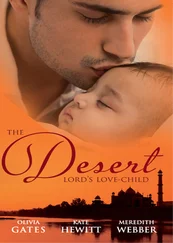For this reason, Reggie preferred to feel sorry for himself in the privacy of his own bedroom. On Charitye’s last night, he stayed awake in bed, staring up at the stray hairs in his eyebrows, remembering Allison. This was an insomniac pastime he’d grown to resent and rely on.
One thing he resented: the beginning, the time spent waiting behind her in the small (God, how short the lines used to be in the Antelope Valley!) registrar’s line at the community college. Allison kept turning around, this sunburned and goofy farm-girl-turned-student. Certain freckles on her face were illuminated by the holes in her straw hat. Nineteen eighty, and he was wearing a Reagan button on his denim jacket. Allison said, “Reagan, huh? Plays a cowboy on TV, but he’s too goddamn slick to be good for farmers.” She reached out and unfolded the list Reggie had been carrying at his chest so she could see which classes he was signing up for. Skeptically, she said, “Beginning Poetry. Next semester you’ll take the course on finishing a poem, that how it works?” Reggie started to correct her, but Allison interrupted. “A joke,” she said. “I know you Republicans ain’t heard many, but they’re called jokes.” Later, over coffee, she described her father’s farm, and Reggie asked her to repeat the word “weevils” a hundred times—“Way-vulls, way-vulls, what’s so funny about way-vulls?”
He was resentful, too, of the end. He’d found her in the stable, her eyes open and crossed like a child’s funny-face. A surprising lack of blood (flooding, as it did, to the inside of her skull). The seat of her pants was covered in shit — he’d figured, wrongly, that she fell in horse dung. She’d gone to the hospital then, alive in no way but a technicality, until her body made the decision for everyone and just quit. When he returned home, Reggie thought of nothing so much as beating Genie to death with a shovel. He must have held the spade so tight, it bruised the back of his hands. How long did he look that animal square in its enormous, intelligent eyes before telling it — out loud, like he’d just realized—“You’re a fucking horse.” He resented the end because Allison’s death brought with it a severe loneliness, a reminder of his own impending death, of not having children in the world to sweeten the tasteless batter of mortality.
It occurred to Reggie that every time he thought he was remembering Allison, he was actually remembering the way she’d made him feel at different points in their entangled lives — that anytime we try to remember anyone we’ve loved, what we’re really remembering is ourselves.
Of course, a man can think in this way for only so long before it becomes tedious. So Reggie willed himself out of bed. The sun wouldn’t be up for another three hours or so. He felt his way along the dark hallway into the kitchen, where he opened the fridge, searching for juice. The light from inside the refrigerator hurt his eyes. To let them adjust, he turned away. That’s when he saw the sheet of paper — frills along the left edge where it had been torn from the spiral notebook — on the kitchen table:
Uncle Reggie,
Here’s that poem I promised. It’s called “The Costs and Benefits of Desert Agriculture,” and it’s a draft so don’t judge it too harshly.
Men built a river so that desert girls can finger
the nutrient-heavy leaves of alfalfa
in the summertime. Chickens clamor
while horses eat six-dollar bales
of hay. If men built the river so that water
flows west, can the water change its mind
and flow east? Can the desert girls swim
against the current with nothing on
but the lights of a carjacked pickup?
Can the horse tiptoe into the widower’s
bedroom & whisper apologies before daylight?
I know, I know. Ending a poem on a question. I had a bunch of lines about wearing Aunt Allison’s hat at the end, but that seemed less poetic and more trying-to-be-poetic, you know? Thanks for letting me stay here, and for everything you’ve taught me. By the way, I’m borrowing your truck for a trip. It’s time I took that dare. Love, your niece, and forever
Yours,
Charitye Peterson
Reggie ran to the spare bedroom to check if she was pulling a prank. She wasn’t. He ran outside, and, sure enough, his truck was missing. Considering his options, he found a flashlight and made his way to the stable, out of breath. He mustered a hello to Genie. Careful not to stand behind her, he lugged Allison’s old saddle over Genie’s back and whispered into her ear: “I’m going to learn how to ride you tonight, okay?”
Atop the horse in his boots and hat, Reggie looked the part. But no matter how high he lifted his chin, the rest of his body’s posture — crouched low to Genie, one shoulder higher than the other for some twisted sense of balance — proved how ridiculous a man he’d become. For miles and miles he rode, speaking in a low, cinematic voice into Genie’s ear: “In the middle of the night, a man and his horse ride out of the farmland and into the suburbs, past the fast-food chains and used-car lots and community college, into the foothills above Avenue N, upward, upward to the aqueduct where he suspects to find and rescue his runaway niece.” He laughed at himself. He said, “Genie, babe, we’re almost there.” Genie, out of shape from years of disuse, spat her breaths. They’d been riding for an hour, maybe more; the sun was getting ready to rise. Charitye’s poem was the poem of a teenager, Reggie thought, but he knew it was better than anything he’d ever written. He especially enjoyed those last lines: “Can the horse tiptoe into the widower’s / bedroom & whisper apologies before daylight?” He enjoyed imagining what else Genie might whisper to him in the nighttime. Maybe she’d have a toothpick-in-the-mouth drawl, and whisper: “Let’s go someplace new, cowboy. That girl ain’t gonna be up there at that old waterin’ hole. I reckon she’s long gone by now, way out past these parts. It’ll just be you and me and the aqueduct. What are you planning, Reggie? You aim to kill us tonight? Walk me right into the river? You know the sayin’ about leadin’ a horse to water. Hey, why don’t we drop this nonsense and go someplace new? Because all I know is, that young girl’s mother’s gonna be knockin’ at your door pretty soon here, Reggie. How ’bout let’s not be there when she gets there. How about it, huh? Promise me. Let’s be anywhere but there.”
* * *
Wherever Reggie went, I never saw him again. Charitye I sought out recently. She’s a server at the Bunker Burger off Knickerbocker’s golf course, and during her break, we spoke for a little while. About five years ago, she said, they expanded their driving range. Lushest Bermuda grass in town.
First, attend one. After all, if you’re not willing to spend the sixteen dollars to see, for example, a modern, gay, Spanish adaptation of Romeo and Juliet titled Ramón y Julio, how can you expect anyone to see yours? If the production you’ve chosen to attend is in, say, your hometown, some 350 miles south of your San Francisco apartment, rent a car. Take the weekend. Remind yourself that this is why, as a blogger, you’ve sacrificed workplace companionship and a consistent reason to dress yourself in the morning — this mobility.
Take more than the weekend. Take your boyfriend, Lloyd. Understand that the five hours on the road might be tense. Lloyd, despite a tearful heart-to-heart between the romance shelves at Dog-Eared Books, still may not have totally forgiven you for not letting him meet your mother. Now it’s too late. Understand that the only way to make up for this is to introduce Lloyd to your father, and that this is the real reason the two of you are going to the Antelope Valley. Lloyd knows this, too, of course, but neither of you should mention it. Instead, continue talking about the modern, gay, Spanish adaptation of Romeo and Juliet, and tell yourself you’ve made a leap in maturity, that you feel so ready to share your family with another person that a conversation about bringing Lloyd home would merely seem self-congratulatory.
Читать дальше












